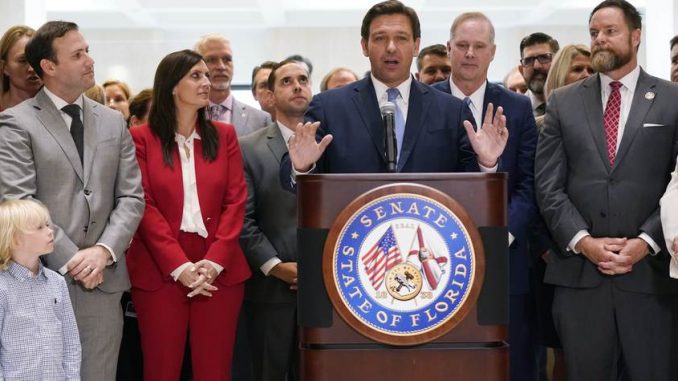
That’s how the Associated Press’s deliberately inflammatory headline frames the stakes here. Are they right?
Short answer: Not really, but sort of?
Longer answer: The bill is facially neutral as to race. It doesn’t bar schools and businesses from causing “discomfort” or “guilt” to whites specifically during instruction or training. It bars them from causing discomfort or guilt on the basis of race with respect to any race. If you uncork a white supremacist rant while addressing your staff or your classroom, you’d face consequences under this law.
In fact, the legislator who sponsored it is Hispanic, Republican Manny Diaz.
That said, this is obviously part of the GOP’s effort in Florida and other red states to legislate against Critical Race Theory, which concerns itself with “structural racism” that gives whites specifically certain legal and social privileges that minorities don’t enjoy. This bill isn’t in motion because there’s a rash of teachers using the N-word in class. It’s in motion because Republican parents are worried that school lessons and workplace seminars on subjects like unconscious racism and “microaggressions,” etc, are imputing collective racial guilt to whites. The bill is an attempt to limit that, and to give Ron DeSantis something to point at to impress the base whenever he finally ends up running in a Republican presidential primary.
“A bill pushed by Republican Florida Gov. Ron DeSantis that would prohibit public schools and private businesses from making white people feel ‘discomfort’ when they teach students or train employees about discrimination in the nation’s past received its first approval Tuesday,” the AP story begins. Again, though, the bill itself isn’t limited to whites. Here’s the key bit from the section on workplace training:


Nothing in there about “whites.” But if you know the first thing about CRT, you know which race is apt to be accused in a discourse on racial oppression led by a member of a teachers union or HR official in corporate America. Lefties are crying foul:
Democrats argued the bill isn’t needed, would lead to frivolous lawsuits and said it would amount to censorship in schools. They asked, without success, for real-life examples of teachers or businesses telling students or employees that they are racist because of their race.
“This bill’s not for Blacks, this bill was not for any other race. This was directed to make whites not feel bad about what happened years ago,” said state Sen. Shevrin Jones, who is Black. “At no point did anyone say white people should be held responsible for what happened, but what I would ask my white counterparts is, are you an enabler of what happened or are you going to say we must talk about history?”
The bill does create exceptions for talking about history. The section on workplace training permits discussion of the concepts listed above “as part of a course of training or instruction, provided such training or instruction is given in an objective manner without endorsement of the concepts.” The section on school lessons clarifies that teachers may “address, in an age-appropriate manner, the topics of sexism, slavery, racial oppression, racial segregation, and racial discrimination, including topics relating to the enactment and enforcement of laws resulting in sexism, racial oppression, racial segregation, and racial discrimination.” But they can’t “indoctrinate” their students into a point of view that conflicts with the statute, e.g., that an individual “does not bear responsibility for actions committed in the past by other members of the same race or sex.”
Where does all of that leave us? If a teacher tells his students that “white people oppressed black people for hundreds of years in the United States,” is that actionable under this statute? It might cause white students “discomfort” or “guilt” to hear whites indicted as a race that way. But how else should it be put? Saying that certain whites oppressed certain blacks wouldn’t capture the extent to which African-Americans were subjugated systematically and institutionally before the civil rights era. You can see why Dems worry that some parents acting in bad faith might try to steer schools away from teaching ugly chapters of American history altogether for fear of inadvertently landing in legal jeopardy under the bill.
I’m curious to see what the courts make of the workplace training section. Banning CRT in classrooms is usually justified on grounds that kids are impressionable and apt to internalize any “whites are evil” messaging coming from the authority figures around them. But this bill would apply to grown adults while on the job, an intellectually sturdier and less dependent cohort. Employers don’t have free rein to say whatever they want to their adult staff with impunity, of course; to take one example, making sexual come-ons to your subordinates could get you sued. But if someone were to observe at a work meeting, for instance, that it’s evidence of prejudice that blacks are disproportionately incarcerated for the crimes they commit in America, would that run afoul of paragraph 3 above by implying that blacks are oppressed partly on the basis of race? If HR gave a tutorial on “microaggressions,” i.e. minor behaviors by whites that are apt to be interpreted as slights by nonwhites, would that violate the “discomfort” clause in paragraph 7?
At what point does the First Amendment protect a boss’s right to cause “discomfort” to his employee by stating a political opinion, particularly if he has facts to back it up? I’m guessing we’re eventually going to find out.
Via Hot Air
